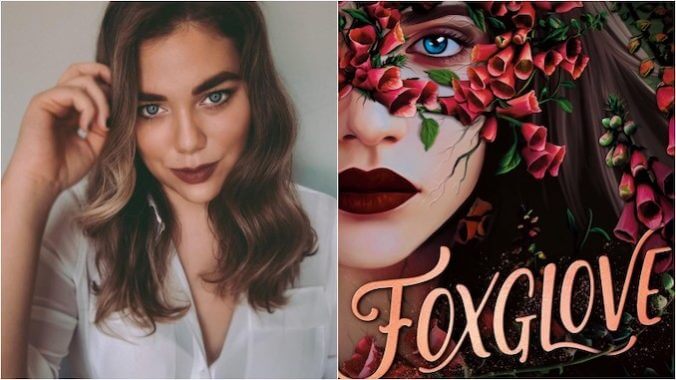Adalyn Grace Breaks Down Foxglove, Fate’s Arrival, and What It All Means For Signa’s Journey

Adalyn Grace’s Foxglove is a sequel that has to serve a lot of masters—-the Belladonna follow-up adds a new POV character, tackles a new mystery, plays with new tropes, and even introduces a new immortal to heroine Signa Farrow’s life. That it manages to effortlessly expand the series’ scope and create a world that feels much broader than its predecessor is a welcome surprise as it deftly juggles frequently competing plots and voices.
The introduction of Death’s brother Fate is only one of the big swings Grace takes in Foxglove, a sequel that not only continues Signa’s journey but centers it in a world that’s no longer focused solely on her and her emotional arc. Other characters, new relationships, and different settings are all given a chance to shine, and the end result is a fantasy world that feels rich, vibrant, and fully alive. (And don’t worry, shippers—there may be a hot new immortal on the scene, but Signa and Death still get plenty of chances to recommit to their bond with one another.)
We got the chance to chat with Grace herself about her highly anticipated sequel, how its story differs from Belladonna, the arc of Signa and Death’s romance, and lots more.
![]()
Paste Magazine: Tell us a little bit about Foxglove! How do you see its story versus Belladonna’s and was it easier or harder to write than its predecessor?
Adalyn Grace: Oh my goodness, Foxglove was significantly harder. At least for me, it always feels harder to write a sequel. You want to do the story and characters justice and give readers who loved the first book a story that they can feel satisfied with. There’s much more pressure! And from a craft standpoint, Foxglove was also more of a challenge because there are more characters, more locations, new magics, and an additional POV to balance.
This book is also less Gothic than its predecessor, which was interesting to discover. I think the characters are all in a very different place starting Foxglove than they were in Belladonna, which has them seeing things differently and has things ultimately feeling a little less dark. It’s also a different time of year and during the social season, which has it feeling much different from the autumnal vibes of Belladonna!
Paste: One of my favorite things about this book is that it makes Blythe a POV character! How do you see her journey in this story and how did she evolve over the course of it for you?
Grace: Thank you! Blythe has absolutely been one of my favorite characters to write! She’s nosy, snappy, and remarkably self-assured. She tends to say exactly what she’s thinking, and I personally find her to be one of the funniest characters in my books.
I always knew that she was going to be an important character in the sequels, but I didn’t know until I started drafting that she was actually going to have her own POV. It just felt very natural to write it, and I think the story ultimately needed her perspective in order for it to work the way I wanted. Blythe has grown a lot since Belladonna, and it’s been really fun to have the chance to explore more of her character.
Paste: How did you figure out how best to balance the many competing elements of this story—-Signa versus Blythe’s voices, their individual emotional journies, their respective relationships with each other, and the immortals in their lives?
Grace: So, so many edits. This series truly is such a mesh of genres, and I wanted each element (the fantasy, the mystery, the romance) to all feel whole and original.
I recently finished drafting my next book, and I can easily say now that Foxglove was by far the most difficult to write out of all five of my books so far. There were so many points where I was convinced that I was never going to finish it, and where I would be really dramatic and wallow on my floor in despair. That said, those hardships have made me even prouder of this book, and I’m really excited for it to be out in the world and make its way to readers
Paste: Foxglove also introduces Death’s brother Fate. Talk to me a little bit about how you see his character and how it relates to/compliments/contrasts with Death’s?
Grace: Fate is very much a foil for Death. His character was originally loosely inspired by a mix of Klaus from The Vampire Diaries and Howl Pendragon, and though I think he’s changed a lot from that conception, the roots are still there.
Fate has so much that his brother wants—he can be seen, he can touch without killing and interact with the normal world, he’s charming and enigmatic . . . Him and Death are natural foils; he weaves the fates of the living and battles with getting attached to them while Death, of course, reaps everyone that Fate considers to be his personal masterpiece. They have an interesting dynamic that was a lot of fun to write.
-

-

-

-

-

-

-

-

-

-

-

-

-

-

-

-

-

-

-

-

-

-

-

-

-

-

-

-

-

-

-

-

-

-

-

-

-

-

-

-








































